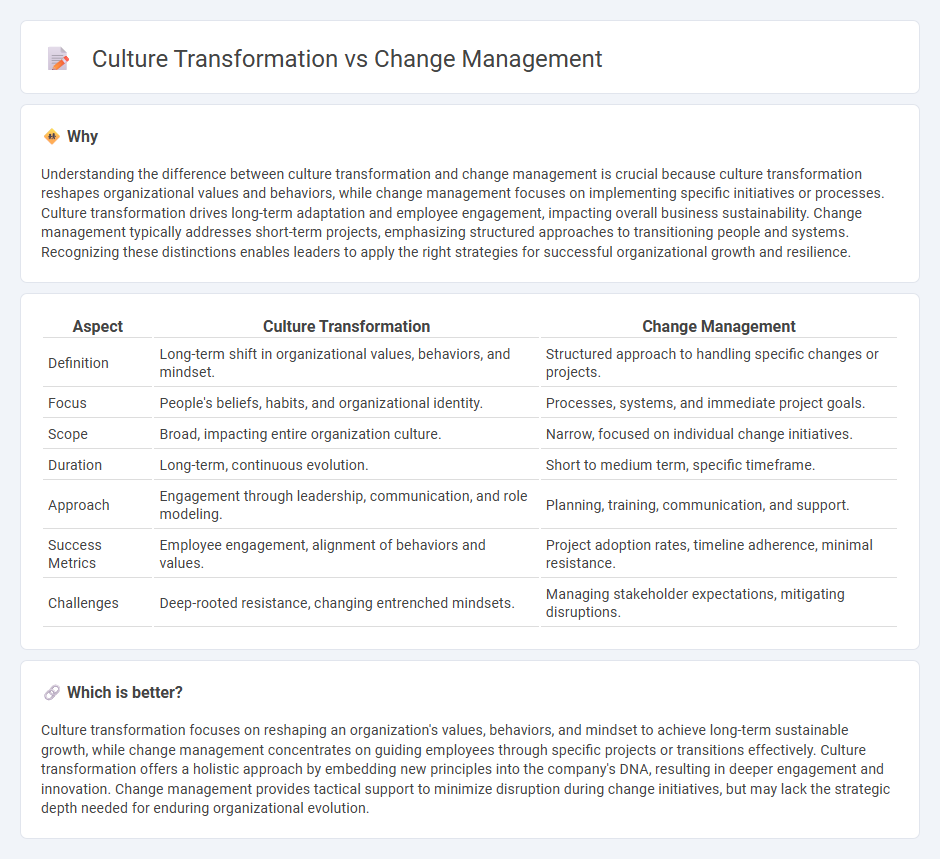
Culture transformation focuses on reshaping the core values, beliefs, and behaviors within an organization to drive long-term success and employee engagement, while change management emphasizes the structured approach to transitioning individuals and processes during specific projects or initiatives. Effective consulting combines both strategies to ensure sustainable growth by aligning cultural shifts with operational changes. Discover how integrating culture transformation and change management can accelerate your organization's evolution.
Why it is important
Understanding the difference between culture transformation and change management is crucial because culture transformation reshapes organizational values and behaviors, while change management focuses on implementing specific initiatives or processes. Culture transformation drives long-term adaptation and employee engagement, impacting overall business sustainability. Change management typically addresses short-term projects, emphasizing structured approaches to transitioning people and systems. Recognizing these distinctions enables leaders to apply the right strategies for successful organizational growth and resilience.
Comparison Table
| Aspect | Culture Transformation | Change Management |
|---|---|---|
| Definition | Long-term shift in organizational values, behaviors, and mindset. | Structured approach to handling specific changes or projects. |
| Focus | People's beliefs, habits, and organizational identity. | Processes, systems, and immediate project goals. |
| Scope | Broad, impacting entire organization culture. | Narrow, focused on individual change initiatives. |
| Duration | Long-term, continuous evolution. | Short to medium term, specific timeframe. |
| Approach | Engagement through leadership, communication, and role modeling. | Planning, training, communication, and support. |
| Success Metrics | Employee engagement, alignment of behaviors and values. | Project adoption rates, timeline adherence, minimal resistance. |
| Challenges | Deep-rooted resistance, changing entrenched mindsets. | Managing stakeholder expectations, mitigating disruptions. |
Which is better?
Culture transformation focuses on reshaping an organization's values, behaviors, and mindset to achieve long-term sustainable growth, while change management concentrates on guiding employees through specific projects or transitions effectively. Culture transformation offers a holistic approach by embedding new principles into the company's DNA, resulting in deeper engagement and innovation. Change management provides tactical support to minimize disruption during change initiatives, but may lack the strategic depth needed for enduring organizational evolution.
Connection
Culture transformation and change management are intrinsically linked, as effective change initiatives require aligning organizational values, behaviors, and mindsets with new strategic goals. Consulting firms leverage culture assessments and stakeholder engagement to tailor change management frameworks that foster employee buy-in and sustainable adoption. The success rate of transformation projects increases significantly when culture factors are integrated into the change management process, reducing resistance and enhancing performance outcomes.
Key Terms
**Change Management:**
Change management involves structured processes and tools designed to transition individuals, teams, and organizations from a current state to a desired future state, ensuring minimal disruption and maximum adoption. It emphasizes clear communication, stakeholder engagement, and training to effectively implement new systems, processes, or behaviors. Discover how mastering change management can drive successful organizational growth and resilience.
Stakeholder Engagement
Stakeholder engagement plays a crucial role in both change management and culture transformation, with change management prioritizing structured communication and active involvement of key decision-makers to ensure smooth transitions. Culture transformation requires deeper emotional resonance and shared values among employees, fostering genuine commitment and long-term behavioral shifts. Explore further how targeted stakeholder strategies drive success in evolving organizational dynamics.
Communication Plan
Effective communication plans are critical in both change management and culture transformation, ensuring clarity, alignment, and engagement throughout the process. Change management communication typically emphasizes specific project milestones, roles, and impacts, while culture transformation communication centers on values, behaviors, and long-term vision integration. Explore detailed strategies to optimize your communication plan for successful change and culture shifts.
Source and External Links
What is Change Management? Definition & Process - WalkMe - Change management is a structured approach to guiding organizations and their people through transitions by establishing clear objectives, planning, providing support and training, and continuously monitoring progress to ensure lasting adoption.
What is Change Management? - IBM - It is the methodical process organizations use to communicate and implement change, ensuring both people and processes are supported throughout, often due to events like mergers, leadership shifts, or technology adoption.
What is Change Management? Organizational, Process ... - ASQ - Change management refers to the strategies and procedures companies employ to define, communicate, and execute changes in internal and external processes, emphasizing clear communication, risk assessment, and cross-functional teamwork.
 dowidth.com
dowidth.com